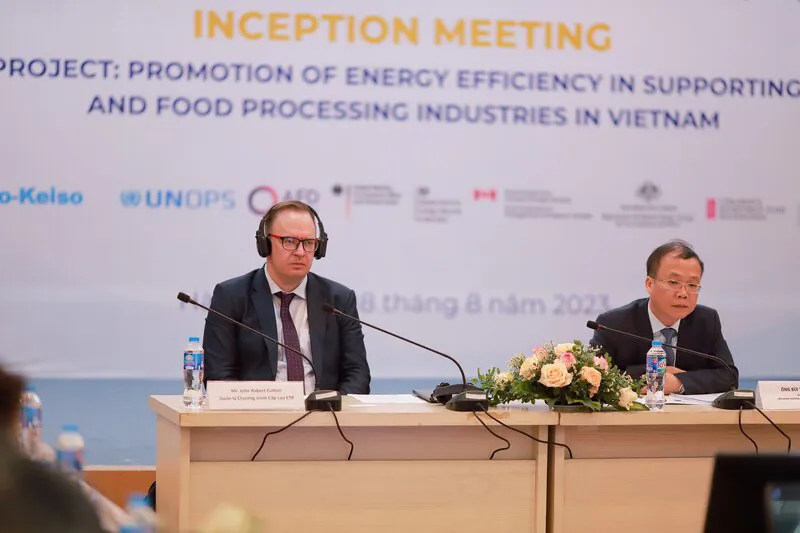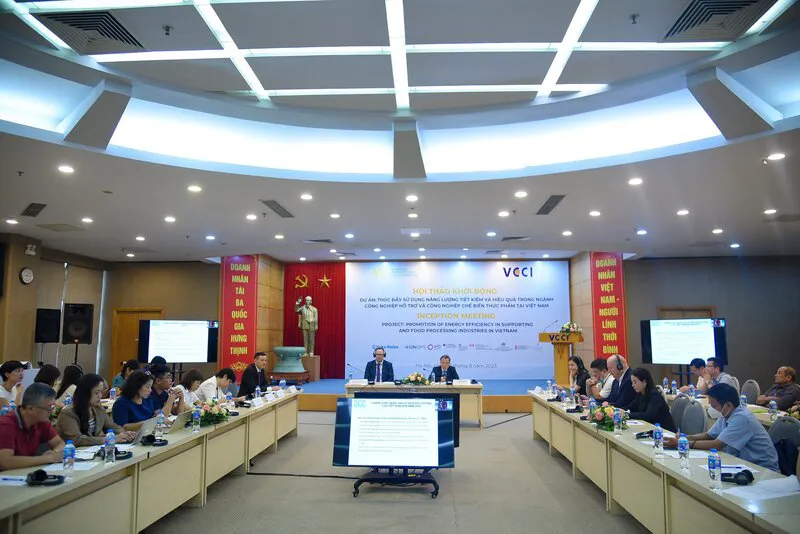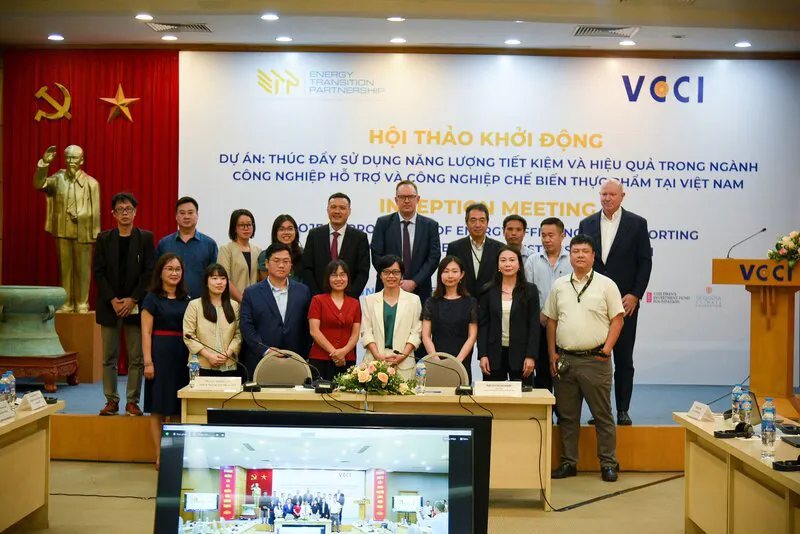Vietnam could lead regional efforts in energy transition: ETP
The country has significant and economically viable potential for ventures in the renewable energy sector as well as for initiatives that focus on energy efficiency.
With Vietnam's strong commitment at COP26 to achieve net-zero carbon emissions by 2050, the country has the potential to emerge as a leader in energy transition efforts within Southeast Asia.
| John Robert Cotton, Senior Program Manager of the Southeast Asia Energy Transition Partnership (ETP). Photos: Khanh Huy/The Hanoi Times |
John Robert Cotton, Senior Program Manager of the Southeast Asia Energy Transition Partnership (ETP), made the remarks at the kick-off meeting of the “Promotion of Energy Efficiency in Supporting and Food Processing Industries in Vietnam” project held in Hanoi today [August 18].
The workshop is funded by the ETP and conducted in partnership with the Vietnam Chamber of Commerce and Industry (VCCI) and other partners.
Cotton noted that ETP, a multi-donor partnership of government and philanthropic partners led by the United Nations Office for Project Services (UNOPS), aims to accelerate a sustainable energy transition in Southeast Asia in line with the Paris Agreement and the Sustainable Development Goals.
"Vietnam, along with the Philippines and Indonesia, is the focus of ETP in the region," said Cotton, noting that these countries have high energy demand and a notable prevalence of energy projects.
"However, the countries have significant and economically viable potential for renewable energy projects as well as energy efficiency initiatives," he added.
| Overview of the meeting. |
The ETP representative explained that within Vietnam, the food processing and supporting industries are experiencing rapid industrialization, with significant potential to reduce energy consumption and greenhouse gas emissions.
However, many of these companies face challenges in adopting energy-saving measures due to limited access to information on energy efficiency, sustainability, and green production practices.
Moreover, financial and technical constraints often lead manufacturers to overlook energy-efficient and cost-effective solutions, including the ability to assess energy consumption and develop projects to secure appropriate investment sources, he said.
To promote sustainability, Cotton suggested promoting the Energy Services Company (ESCO) business model, which has yet to be widely adopted by manufacturing companies in Vietnam.
Echoing Cotton's sentiments, Bui Trung Nghia, Vice President of VCCI, stressed the importance of awareness campaigns to change behaviors and increase understanding of energy conservation among employees, businesses, and associations.
"By using modern technology, automating production processes, and using energy-efficient equipment, technical support efforts have the potential to reduce electricity consumption by 20-40%, depending on the scale and technology level of the manufacturing sector," Nghia said.
"The active engagement of businesses in implementing energy-saving solutions in production is crucial for both socio-economic progress and ensuring the country's energy security," he continued.
| Delegates at the meeting. |
Nguyen Thi Thanh Huyen, VCCI's project coordinator, added that the main goal of the project is to raise awareness within the two industries.
The aim is to help companies access financing for investments in energy-efficient practices. Furthermore, the project would help establish links between manufacturers, financiers, and ESCOs; pilot the evaluation of energy efficiency standards tailored to the two sectors; and create a roadmap for the establishment of an ESCO association in Vietnam.
"This objective will be achieved through a comprehensive approach that involves technical assistance, energy efficiency capacity building, and guidance on formulating financially feasible proposals for energy efficiency projects. The project is expected to promote improved resource utilization, the adoption of conscientious practices throughout the manufacturing supply chain, the advancements in social and environmental conditions, and the reduction of carbon emissions in these two energy-intensive sectors."
Jørgen Hvid, Senior Advisor of the Danish-Vietnamese Energy Partnership Program, expressed his eagerness to collaborate with VCCI and ETP in the implementation of industrial energy saving endeavors.
This cooperation, he said, would include liaising with ESCO units, disseminating training content, and supporting capacity building of enterprises in pursuit of energy efficient and economic goals.
Nguyen Thi Thanh An, head of the climate and energy team at the Agence Française de Développement (AFD), said the agency has committed more than €2.3 billion (US$2.5 billion) to more than 100 programs and initiatives focused on sustainable development.
"AFD's operational strategy has a clear focus - to support Vietnam's path to green and sustainable growth," An emphasized.
"AFD can provide green credit lines to banks, enabling them to lend to businesses. Under this mechanism, AFD is willing to provide the bank with guarantees to participate in risk sharing," she noted.
The "Promotion of Energy Efficiency in Supporting and Food Processing Industries in Vietnam" project, conducted in collaboration with various partners, will have a two-year pilot phase from 2023 to 2025. The scope of this endeavor encompasses both supporting and food processing industries in Vietnam. The expected outcomes of the project include the dissemination of awareness and enhanced managerial approaches for economical and efficient energy consumption among 100 manufacturers in these two industries. Furthermore, the initiative aims to support the development of feasible energy efficiency projects for 10 factories, facilitate the integration of energy efficiency technologies in three factories engaged in support industries and food processing, and establish a comprehensive network focused on energy conservation and efficiency involving manufacturers, energy service companies (ESCOs), financial institutions, and relevant stakeholders. In addition, the project aims to support the formulation of a roadmap for the establishment of an ESCO association and initiate a pilot program for a benchmarking tool dedicated to energy conservation and efficiency. |















